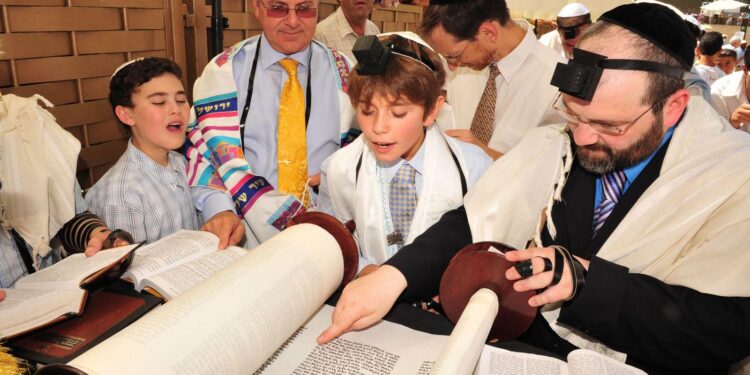As debates over identity and security intensify across Europe, questions surrounding the future of Jewish communities have taken on renewed urgency. In the Netherlands, once home to one of Europe’s most vibrant Jewish populations, concerns about assimilation, anti-Semitism, and demographic shifts have sparked a critical conversation: Is there a future for Jews in this country? This article explores the challenges and hopes facing Dutch Jewry today, examining the social, cultural, and political factors that will shape their trajectory in the years to come.
Challenges Facing Dutch Jewry Amid Rising Antisemitism and Integration Concerns
In recent years, the Jewish community in the Netherlands has been grappling with a surge in antisemitic incidents that have severely tested its resilience. These acts range from verbal harassment and graffiti defacement to physical assaults, creating an environment of anxiety and insecurity. Institutions, synagogues, and schools have increasingly fortified their premises, underscoring a broader societal failure to adequately address this rising tide of hate. Community leaders emphasize the critical need for stronger governmental action and public education to counteract these troubling trends:
- Legislative reinforcement: tighter enforcement of hate crime laws and enhanced penalties.
- Public awareness campaigns: initiatives aimed at debunking myths and fostering coexistence.
- School programs: education about Jewish history and the dangers of antisemitism.
At the same time, integration challenges persist within the community, particularly regarding identity preservation amidst the pressures of assimilation. Younger generations often find themselves balancing Dutch societal norms with the rich traditions of their heritage. This dynamic has led to complex discussions on how to maintain cultural continuity without alienating broader society. Within families and communal organizations, there is an ongoing dialogue about religious observance, language use, and social engagement. The complexity is often summarized in the following overview:
| Aspect | Challenge | Community Response | ||||||||||||||||||||||||||
|---|---|---|---|---|---|---|---|---|---|---|---|---|---|---|---|---|---|---|---|---|---|---|---|---|---|---|---|---|
| Religious Practice | Declining participation in traditional rituals | Youth engagement programs and inclusive services | ||||||||||||||||||||||||||
| Language | Loss of Hebrew and Yiddish fluency
|——————|————————————–|——————————————–| | Religious Practice| Declining participation in traditional rituals | Youth engagement programs and inclusive services | | Language | Loss of Hebrew and Yiddish fluency | Language classes and cultural workshops | | Social Engagement| Balancing assimilation and cultural identity | Intergenerational dialogue and community events | If you’d like, I can help you fully format or expand this table or develop any further content regarding the Jewish community in the Netherlands. Just let me know! Community Resilience and Cultural Revival Efforts Across the NetherlandsAcross the Netherlands, Jewish communities are spearheading vibrant initiatives aimed at restoring cultural pride and fostering resilience amid contemporary challenges. From Amsterdam’s renewed kosher culinary festivals to Rotterdam’s youth-led heritage workshops, these efforts signal a determined reclaiming of spaces long threatened by assimilation and declining numbers. Synagogues are no longer just places of worship but dynamic community hubs hosting educational programs, art exhibitions, and interfaith dialogues designed to strengthen bonds within and beyond Jewish circles. Local organizations have emphasized the importance of intergenerational collaboration and inclusivity, fueling a renaissance rooted in tradition yet responsive to modern needs. Notable projects include:
Policy Recommendations for Safeguarding Jewish Life and Heritage in Dutch SocietyTo ensure the continued vibrancy of the Jewish community within the Netherlands, policymakers must prioritize robust measures addressing both security and cultural preservation. Enhanced collaboration between law enforcement agencies and Jewish institutions is essential to proactively counter anti-Semitic threats. Equally critical is the integration of comprehensive educational programs about Jewish history and contributions into national curricula, fostering mutual respect and understanding among younger generations. Investing in public awareness campaigns can further combat prejudice and misinformation, reinforcing societal cohesion. Concrete steps should also be taken to support Jewish cultural heritage through protected sites, museums, and community centers that serve as living testaments to the Dutch-Jewish legacy. Key policy actions include:
Wrapping UpAs the Jewish community in the Netherlands navigates a complex landscape marked by both challenges and opportunities, its future remains uncertain yet resilient. Factors such as rising antisemitism, demographic shifts, and cultural integration continue to shape the discourse, while efforts to preserve heritage and strengthen communal ties persist. The question of whether there is a future for Jews in the Netherlands is not merely one of survival but also of adaptation and renewal—an ongoing story that will unfold in the years to come. |














